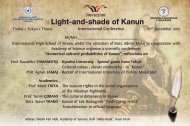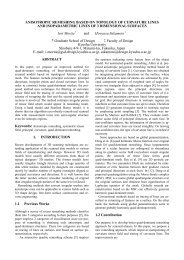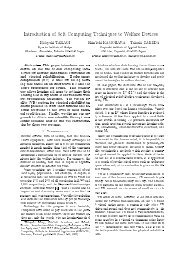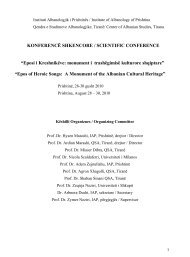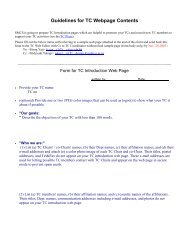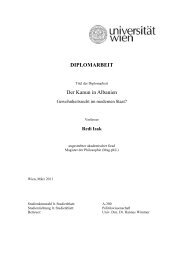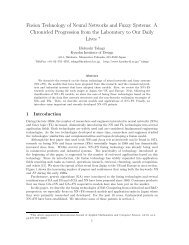Features Of The Soundscape In Fukuoka City, A Major City In Japan ...
Features Of The Soundscape In Fukuoka City, A Major City In Japan ...
Features Of The Soundscape In Fukuoka City, A Major City In Japan ...
You also want an ePaper? Increase the reach of your titles
YUMPU automatically turns print PDFs into web optimized ePapers that Google loves.
Table 1. <strong>The</strong> answers to the first question: the sounds usually heard in<strong>Japan</strong> but never heard in home countries (numbers in the parenthesesshow numbers of answers>All respondents’ answers (more than 3 answers) :exhaust pipe noise by delinquent bike riders (Bousouzoku) (53), aircraftnoise (21) , crow caws (15)) traffic sound signal for the blind (II> ,chirping of cicadas (9), peddlers’ cries (81, sounds of <strong>Japan</strong>ese-stylepinball (Pachinko) game parlor (7), exhaust pipe noise of motorcycles(7), sound alarm of railroad crossing (6)) sound of train (51, electioncampaign broadcast (5), traffic noise (5), festival (41, community noise(4)) sound of waves at the beach (4)) bird chirping (31, tolling of templebells (3), construction noise (3), dog barking (3), fireworks (3), frogcreakings (3)Chinese respondents’ answers (more than 3 answers) :exhaust pipe noise by delinquent bike riders (Bousouzoku) (401, aircraftnoise (13)) traffic sound signal for the blind (8), crow caws (71, exhaustpipe noise of motorcycles (6), traffic noise (4), sound of waves at thebeach (4), election campaign broadcast (41, sounds of <strong>Japan</strong>ese-stylepinball (Pachinko) game parlor (4), chirping of cicadas (3), dog barking(3), peddlers’ cries (31, community noise (3)Korean respondents’ answers (more than 2 answers) :exhaust pipe noise by delinquent bike riders (Bousouzoku) (4), crowcaws (4)) aircraft noise (3), sound alarm of railroad crossing (2)<strong>The</strong> second most frequently indicated sound is “aircraft noise.” <strong>The</strong>respondents say “it is noisy, the airport should move, and classes areinterrupted by aircraft noise.”<strong>Fukuoka</strong> <strong>In</strong>ternational Airport is located near the center of <strong>Fukuoka</strong>city. <strong>Fukuoka</strong> citizens enjoy easy access to the airport. On the other hand,many inhabitants under the flying route are exposed to aircraft noise. KyushuUniversity is located just under that route. Most of the respondents indicatingthis sound are students of Kyushu University.<strong>The</strong> third-ranked sound is “crow caws.” Recently, in many cities in<strong>Japan</strong>, many crows are in the downtown area. <strong>The</strong>y have been losing theirterritories in the mountain area by development and they can survive ongarbage in urban areas. <strong>The</strong> number of crows is increasing in cities.<strong>In</strong> some major cities in <strong>Japan</strong>, widespread damage to garbage bagsINTERNOISE 98Christchurch New Zealand 16-18 November
torn open by crows is reported. Garbage is normally collected in themorning. However, in <strong>Fukuoka</strong> city, garbage is collected at midnight. So,damage by crows is not so serious here. However, foreigners recognizemany crow caws in <strong>Fukuoka</strong> city. <strong>The</strong> impression of crows is generally“unlucky.” Crow is considered as a bird of ill omen.<strong>The</strong> fourth-ranked sound is “the traffic sound signal for the blind.” Forthe blind, there are two kinds of traffic sound signals in <strong>Japan</strong>. One is thealternate short melodies: “Comin’ thro’ the Rye” (Scottish folk song) or“Please pass by (Touryanse in <strong>Japan</strong>ese) ” (<strong>Japan</strong>ese traditional childsong). <strong>The</strong> other is two alternate bird-song like electronic sounds. <strong>In</strong><strong>Fukuoka</strong> city, two alternate short melodies are used. Impression of thissound is mainly positive. This sound signal is accepted as a necessity tohelp the handicapped.<strong>The</strong> fifth-ranked sound is the “the chirping of cicadas.” Chirping ofcicada is a typical summer sound in <strong>Japan</strong>. It is the keynote sound of<strong>Fukuoka</strong> city in summer. <strong>Of</strong> course, in other parts of Asia, cicadas are heardchirping in summer. However, some respondents are not familiar with thissound. This answer reflects the climate difference.From sixth to tenth, there are “the peddlers’ cries, the sounds of<strong>Japan</strong>ese-style pinball (Pachinko) game parlor, the exhaust pipe noise ofmotorcycles, the sound alarm of railroad crossing, the sound of trains, theelection campaign broadcast, and traffic noise.”<strong>The</strong>re are also many kinds of peddlers’ cries in foreign countries.However, the <strong>Japan</strong>ese peddlers’ cries have unique intonation. <strong>The</strong> cries ofthe peddlers of roast sweet potato is a typical example. <strong>The</strong>y are like singinga song. <strong>In</strong> the past, peddlers’ cries were their natural voices. However,nowadays, most of peddlers use public-address system and their voices areusually tape-recorded.“Pachinko” is a popular amusement for <strong>Japan</strong>ese adults. We can seePachinko parlors in every downtown and along the main streets in <strong>Japan</strong>.<strong>The</strong> combination of steel pinball sounds, electronic sound effects, and loudbackground music makes unique soundscape. <strong>The</strong>se sounds arouse thepassion for gambling. <strong>The</strong> acoustic environment of Pachinko parlors iscurious for foreigners.<strong>Japan</strong>ese election campaign is mainly based on the shouting of thecandidate’s name and “please vote for (the candidate’s name> ” usingpublic-address system. <strong>In</strong> particular, this sound attracts the Chineserespondents.Frequently indicated sounds actually characterize <strong>Japan</strong>esesoundscape. However, minority opinions may usually be based on personalexperiences.INTERNOISE 98Christchurch New Zealand 16-18 November
Second Question: <strong>The</strong> sounds usually heard in home countries lessheard in <strong>Japan</strong>Table 2 shows the answers to the second question (the sounds lessheard in <strong>Japan</strong>) by all the respondents, the Chinese, and the Koreans.<strong>The</strong> most frequently indicated sound for the second question by all therespondents is “car horn.” Impression of this sound is “noisy and irritating.”<strong>The</strong>y wonder why there are few car horns heard although there are toomany cars in <strong>Japan</strong>. <strong>The</strong> restraint on the use of car horn may not be enoughin other Asian countries. Car horn was also a major noise source in <strong>Japan</strong>.However, from about 40 years ago, <strong>Japan</strong>ese police have forbidden overusethe horn.<strong>The</strong> second-ranked sound is “conversation or human voices.” <strong>The</strong>respondents indicate, although there are many people in <strong>Japan</strong>, people aregenerally quiet. <strong>In</strong> other Asian countries (at least, in China and Korea),people talk more on street corners.<strong>The</strong> third-ranked sound is the “ringing of bicycle bells.” This sound isindicated by only Chinese respondents. Among the Chinese, this soundranks the second. Bicycle is a major transportation means in China. Bellringing of bicycle is a feature of Chinese soundscape. Chinese respondentswonder why the <strong>Japan</strong>ese do not use bicycle bells. <strong>The</strong>y use the bell toexchange greetings.Table 2. <strong>The</strong> answers to the second question: the sounds usually heardin home countries but less heard in <strong>Japan</strong> (numbers in theparentheses show numbers of answers>All respondents’ answers (more than 3 answers> :car horns (34) , conversation or human voices (IO> , ringing of bicyclebells (8), construction noise (7), traffic noise (7), bird cries (6), theircountries’ folk songs (6), fire crackers (4), public address (4), cocks’cries (4), sound of train (3), music in the early morning (3)Chinese respondents’ answers (more than 2 answers> :car horn (20) , ringing of bicycle bells (7), construction noise (5), trafficnoise (3), sound of train (3), bird cries (31, fire crackers (31, theircountries’ folk songs (31, conversation or human voices (3)Korean respondents’ answers (more than 2 answers> :car horn (5), conversation about political issues (2)INTERNOISE 98Christchurch New Zealand 16-18 November
<strong>The</strong> other frequently indicated sounds are “construction noise, trafficnoise, bird cries, their countries’ folk songs, fire crackers, public address, etc.<strong>The</strong> explosive sound of fire crackers is a sound symbol of Chinese culture.<strong>The</strong>y use fire crackers in celebrations and festivals. <strong>The</strong> response onconstruction and traffic noise may reflect the differences of regulation ofindustrial noise and noise control technology.Third Question: Total impression of <strong>Japan</strong>ese Acoustic Environment<strong>The</strong> main answer is “although Bousouzoku and airplane are noisy,<strong>Japan</strong>ese acoustic environment is quiet enough.” Also, there are theopinions, “If there are no Bousouzoku and aircraft noise, <strong>Japan</strong>ese acousticenvironment is good, generally quiet, or very quiet.”Some respondents even say, “<strong>Japan</strong>ese acoustic environment islifeless.” Cities in other Asian countries seem to be more lively althoughnoisy.Furthermore, some respondents indicate, “there are many artificialsounds in <strong>Japan</strong>,” or “there are only artificial sounds in <strong>Japan</strong>.” <strong>The</strong>sepeople have negative image of artificial sounds. Exceptions are sound signalfor the blind, chime of school which inform the beginning and end of class,and background music.4. CONCLUSION<strong>The</strong> questionnaire from foreigners living in <strong>Japan</strong> points outcharacteristic sounds in <strong>Fukuoka</strong>. <strong>The</strong> obtained answers are the soundswhich we hear in daily life: the exhaust noise by wild bike riders, the trafficsound signal for the blind, the peddlers’ cries, etc. <strong>The</strong> respondents live in<strong>Fukuoka</strong> city and most of them do not know other cities in <strong>Japan</strong>. However,we hear most of these sounds in other cities as well.<strong>Japan</strong>ese usually do not recognize that these sounds are<strong>Japan</strong>ese-like sounds. However, for foreigners, these sounds characterizethe <strong>Japan</strong>esesoundscape.Impression of acoustic environment of <strong>Fukuoka</strong> city is generally good.However, Bousouzoku noise and aircraft noise damages the impression.REFERENCES[II B. Traux, Handbook for Acoustic Ecology (Vancouver, A. R. C.Publication, 1978) .INTERNOISE 98Christchurch New Zealand 16-18 November



